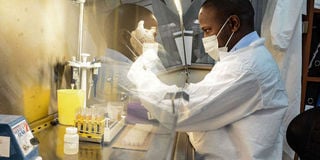Researchers test new drugs for Covid-19 treatment

What you need to know:
- Repurposed HCV drugs: The combination of repurposed drugs for hepatitis C virus (HCV) and remdesivir has been clinically proven to be up to 10 times effective for inhibiting the virus.
- Combination of remdesivir: a drug combination of remdesivir and Baricitinib entered trials in May 2020.
- Steroid drugs: The combination of remdesivir and dexamethasone has been tested for treatment of severe Covid-19.
- Malaria drugs: Clinical trials have since established that hydroxychloroquine is ineffective in treating Covid-19.
Close to two years since the onset of coronavirus, a proper cure is yet to be found in Kenya and around the world.
This is in spite of multiple Covid-19 vaccines being approved for use; but vaccines do not cure a disease, they only "trigger your immune response to recognise and fight disease-causing organisms," WHO says.
The world is still racing to find a cure for coronavirus. Currently, there are three drug approaches that are being investigated for curing the disease.
The first involves antiviral drugs that affect SARS-Cov-2’s ability to thrive and multiply inside the human body.
The second involves drugs that prevent the immune system from overreacting and damaging organs as happens in cases of severe Covid-19.
The third approach includes use of antibodies that target SARS-Cov-2. These antibodies are taken from blood plasma of Covid-19 survivors or are manufactured in a medical laboratory.
Repurposed HCV drugs
Even as these treatment methods are still being developed, there are a few drug options that doctors have been using to treat Covid-19.
The combination of repurposed drugs for hepatitis C virus (HCV) and remdesivir has been clinically proven to be up to 10 times effective for inhibiting the virus.
This was proven by scientists who conducted research on treatment and management of Covid-19 at The Mount Sinai Hospital and School of Medicine in the US.
The scientists established four HCV drugs that can be effectively used together with remdesivir: vaniprevir, simeprevir, grazoprevir, and paritaprevir.
These four drugs inhibit the SARS-Cov-2 protease known as PLpro, boosting the effectiveness of remdesivir by as much as tenfold.
“PLpro inhibitors and remdesivir could be the game changer in the fight against Covid-19 for people who are not yet vaccinated. It could also reduce the possibility of selecting SARS-Cov-2 resistant viruses,” said Dr. Arthur Fishberg, a professor of medicine who led the team of scientists in the clinical trials and analysis of the drug combination.
Remdesivir is a broad spectrum antiviral medication that is developed by the biopharmaceutical company known as Gilead Sciences.
This drug was approved for trials in the management of coronavirus cases in Kenya in 2020. It had been originally developed to treat hepatitis C and a cold-like virus known as respiratory syncytial virus (RSV).
The drug was also found to be safe and effective in the treatment of patients with Ebola. With Covid-19, though, the drug has been more effective when used in combination with other drugs.
Combination of remdesivir
In May 2020, a drug combination of remdesivir and Baricitinib entered trials for the treatment of patients suffering the most severe cases of coronavirus.
The clinical trial was undertaken at the Montefiore Health System’s Albert Einstein College of Medicine following release of results from preliminary treatment trials conducted in April 2020.
These two treatment trials showed that patients with coronavirus who were put on remdesivir and Baricitinib recovered faster than patients who did not receive the drug.
Baricitinib is a drug developed by Eli Lilly and Company pharmaceutical company and sold under the brand name Olumiant.
It is used for the treatment of rheumatoid arthritis in adult patients whose condition is not well controlled using medications that are tumor necrosis factor (TNF) antagonists.
The drug combination of remdesivir and Baricitinib is currently approved for emergency use by the Food and Drug Administration.
“Baricitinib plus remdesivir is superior to remdesivir alone in cutting recovery time and speeding patient’s health improvement. It shortens the recovery period from 18 to just 10 days. This combination is associated with fewer serious adverse events,” said Dr. Andre Kalil, an infectious disease scientist and physician at the University of Nebraska Medical Centre.
According to Dr. Fishberg, the elevated effectiveness of remdesivir and HCV drugs could speed up the approval process because all potential side effects for both drugs are known.
“This combination therapy could be clinically approved faster [than other medications under trial] because the drugs are already approved and in use,” he said.
Prof. Fishberg says the combination therapy is targeted at patients who are in the early stages of Covid-19.
“Although remdesivir can only be administered intravenously and [under] hospitalisation, we are targeting a solution where the drug combination can be administered to outpatients before they are too sick to be admitted [to] hospital,” he said.
Prof. Fishberg said this is possible where oral drugs, such as HCVs that inhibit SARS-Cov-2, are identified.
Steroid drugs
Physicians have also been using the combination of remdesivir and dexamethasone in the treatment of severe Covid-19.
Although dexamethasone blunts inflammation and is cheaper than baricitinib, it can trigger unwanted side effects that include exacerbation of conditions such as diabetes.
Dexamethasone is a steroid medication that is used to treat numerous rheumatic diseases and a host of other ailments including skin diseases, severe allergies, asthma, and chronic obstructive lung disease.
In managing Covid-19, this drug has been used to arrest inflammation in the body. However, the downside to this drug is that it has so far not appeared to work on patients with mild Covid-19 symptoms.
Malaria drugs
Hydroxychloroquine has perhaps been the most controversial drug in the treatment and management of Covid-19.
The drug was highly popularised by former US President Donald Trump because it contains some antiviral and immune calming properties.
Kenya consequently ordered a one-off consignment of 379,000 tablets of hydroxychloroquine from India.
“India has allowed the one-time export of the prohibited Hydroxychloroquine Sulphate USP 200mg, 379,000 tablets to Kenya to support the fight against Covid-19,” a communiqué from the Indian government said.
The order effectively saw Kenya join the list of countries such as the US that were advocating for the repurposing of the malaria drug towards Covid-19 treatment.
However, clinical trials have since established that this drug is ineffective in treating Covid-19.
In July 2020, the WHO discontinued a clinical trial of the drug after recommendations from the Solidarity trials.
The Solidarity therapeutic trial was a multinational clinical trial under the WHO to determine the efficacy of new drugs in hospitalised Covid-19 patients.




